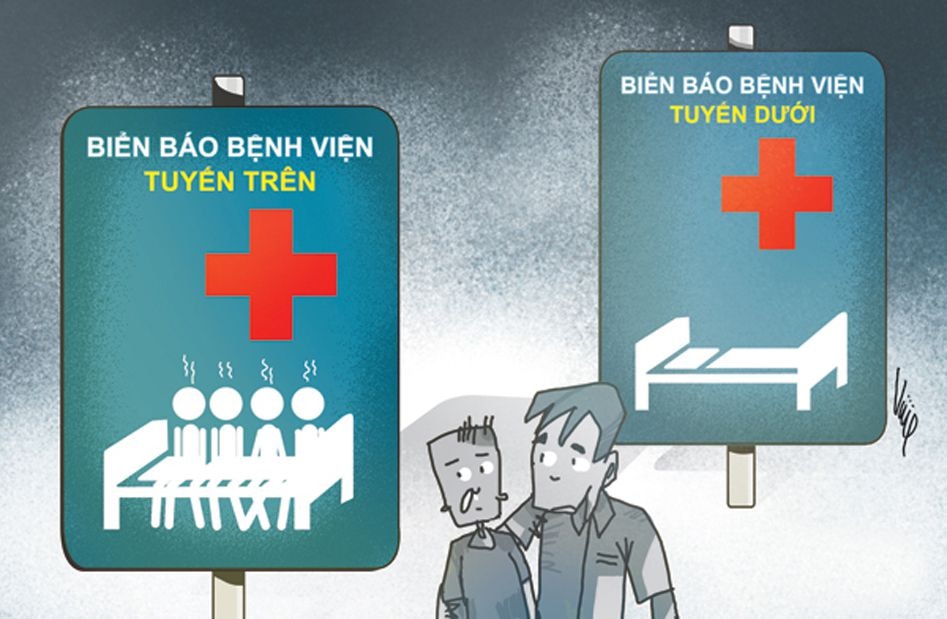Indifferent subtraction
(Baonghean) - Remember, at the online conference summarizing the medical examination and treatment work in 2014, Minister of Health Nguyen Thi Kim Tien affirmed that no more patients having to share beds was one of the 7 urgent tasks of the industry. And "one call, many respond", immediately at the conference, leaders of 13 hospitals under the Ministry of Health signed a commitment not to let patients share beds. As a chain effect, not long after, many hospitals also spoke up to commit not to let patients share beds at different levels...
That quick and strong response made many people feel excited and emotional, because that action demonstrated the high determination of the entire health sector to break through the most difficult and sluggish stage in many years. With that momentum, it will certainly create a new turning point in medical examination and treatment. However, some people are also worried that the quick and widespread response without careful preparation will be too much of a movement and lack substance. That doubt is not without basis.
Because, if we want to eliminate the situation of patients sharing beds, especially in central hospitals, we must reduce the number of patients from other places by improving the quality of medical examination and treatment at grassroots hospitals. Or, we must expand or build more beds for patients. Both of these options require preparation time and cannot be done immediately. If we want to immediately implement that very difficult commitment, the only way is to speed up the process of medical examination and treatment and shorten the time of treatment and recovery to increase the density of patient turnover. Along with that, we must tighten the transfer of patients and send them to outpatient treatment to reduce bed space.
 |
| Illustration - Internet |
As a result, after several months of implementation, that concern has been realized through concrete actions. As a woman whose child is undergoing hemodialysis treatment at the Children's Hospital complained: "Before, when I was an inpatient, when my child had a fever or had any unusual symptoms, I could immediately call the doctor, but now I have to stay as an outpatient, and if there is a problem, I have to take time to take my child to the hospital. It's so complicated!" Then she asserted that this must be because the hospital has committed to not allowing the situation of sharing beds to happen, so they are trying to find ways to release patients as soon as possible. So the rights of patients like my child have been narrowed down to benefit the hospital.
At the Central Hospital for Tropical Diseases, in order to quickly fulfill the commitment of "no sharing beds", they have creatively added more beds in the hospital corridor. Even though the corridor is very wide and clean, there are fans in the summer and heaters in the winter to serve the patients. In addition, when asked, the patients all confirmed that they felt very comfortable and said that lying outside was cooler than lying inside. But honestly, they still feel that the implementation of the commitment is still somewhat shaky, unstable, and unsustainable. At the Central level hospitals, there are many cases where the surgery has just been completed, the wound is not really stable, and the doctors have signed orders to transfer them to lower level hospitals for further treatment. This makes the patients feel sad and worried about their own health and safety.
And people think that the hospital “pushes” them out to make room for others, to avoid having to share beds, not necessarily because their condition has stabilized. Meanwhile, hospitals still do not have a department like “independent audit” to verify and confirm that the discharge is earlier than usual. But as a doctor confided: “Agreeing to resolve the problem of sharing beds is a breakthrough in preventing overload.
However, do we currently have enough potential plans and preparations to reduce casualties for this breakthrough? Or do we really have enough professional assessment processes to decide on timely admission and discharge without endangering patients? To solve the problem of overload, we must solve the problem from the root, have an appropriate service philosophy, gradually transform the system, separate service and medical service provision, build a system, including human resources, material resources, management capacity, capable of meeting the needs. It is not a matter of saying it right away and doing it. It seems that people do this to keep their commitments rather than for the patients.
Therefore, there was a story about a family with a 4-month-old grandchild who, due to being born prematurely, often suffered from respiratory diseases and had to be treated at the Respiratory Department of the National Children's Hospital three times. Each time, the doctor only cured 70-80% of the child and then "sent him home". And so, the disease kept recurring. The family asked to stay for a complete treatment, but the doctor did not agree, because if they continued to stay, there would be no bed, and sharing a bed was absolutely not allowed. Of course, that sad story is not common, but it is still bothersome and lingering in the mind. The ancients have a saying "Haste makes waste", anything done too quickly often does not achieve the desired results. Not only that, but there will be many more consequences from these "hot" commitments and the consequences will force the very patients that the medical industry is hoping to benefit from to suffer the disadvantages.
Don't let the end of bed sharing be a mechanical way to reduce the number of people in hospital. Don't consider "no bed sharing" as an achievement, then turn it into an insensitive subtraction, as long as the commitment is achieved, regardless of everything?!
Buddha Mountain






